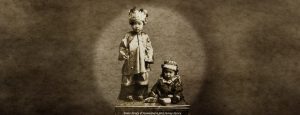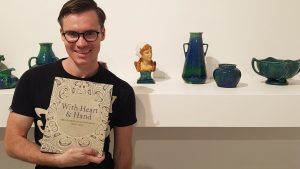By Neville Buch
There are different approaches to history practiced in this state. Family history is very popular. Many of our members are practitioners of local history, as am I. A few get the opportunity to break open a field that cast the research across Queensland. A number of historians do well in heritage studies, and house or property history. And there are arrays of topics that cover the horde of ways Queenslanders live their lives – education, heath, law, transport, employment, gender, children, aging, dying, and so forth.
When we attempt to reflect on the discipline in this general and large picture outlook, we can see that there are several fields in history that don’t get the attention that hard philosophical questions demand. Of course, the biographies and histories of objects and places are very satisfying to the mind, and my remarks here in no way devalues the many contributions which are being made, and there are occasions where the writing of such histories are enriched by philosophical methods and problems. But the questions remain: Where did that idea come from? Why are histories that speak directly to the subject of a person’s beliefs not written more? Why is there such little discourse on what historians think they are doing when they are thinking historically? What is the history of our practice as historians? Indeed, not merely the abstract history of the practice, but the local history of our profession — who we profess to be, living in an Australian state and in a specific timeframe.
My dream life-time project is to prove that Queensland does have an intellectual history, somewhere buried away. I am sure that this must come across as a bizarre and ridiculous thought. To talk of historical ideas in Queensland’s past would assume the existence of notable thinkers, and the response is usually that this is something to expect of Melbourne, not something that is even remotely possible in Brisbane, Toowoomba, Warwick, Roma, Mackay, Rockhampton, Townsville, and Cairns. One thinks of the brain-numbing hedonism of the Gold Coast, not of the Cyrenaics, Epicureans, and Utilitarians. Although one must confess that this is a difficult challenge for the Sunshine State (once referred to as the ‘Smart State’) – to shed light on the darken corridors of historical cognition – we can find notable thinkers, public debates on topics that go beyond basic political advantage, and there maybe hope that we’ll find something close to an original thought. As only a small indicator of that hope, if you search for academics – given that they are typically expected to have big ideas – who lived in Queensland –at one time in their career at least – in the Australian Dictionary of Biography – Online Edition, you get a list of 57 distinguished Australians (see list at the end of the article). There is at least ten in the list who were known for engagement in abstract ideas.
If you got this far in your reading, you would, no doubt, noticed that there are several sub-disciplines involved in the questions I have raised, and they all have something to contribute in Queensland historical study. Definitional problems are to be expected with how to use the terms of the sub-disciplines – if you attempt tease them out – but as a rough guide, there is:
Historiography, or what we can refer to as the theories and methods of history: Usually this refers to the “how to”, as well as how history has been done in the past. Queensland historian Ross Johnston has on several occasions provided some insightful thoughts in this area.
The Philosophy of History: Here the study usually involves elaborate ideas about what history is. It could be “one damn thing after another,” or it could be some type of system. One thinks of the work of Queensland historian Martin Stuart-Fox on the evolutionary theory of history.
The History of Philosophy, and other big ideas or beliefs: The historical studies of notable thinkers and their ideas, as well as how certain ideas, beliefs, fit or do not fit together over time. Long ago, Max Hamilton ran a double-semester second year course on major European thinkers.
The History of Ideas: Usually the study that traces the history of a concept, an idea, or a collection of beliefs. Some scholars have referred to this study as a “genealogy.” My own work on Queensland conservative Protestantism was not merely an institutional history but an attempt to trace systems of belief back to nineteenth and twentieth century American revivalist culture.
Intellectual History: The historical study of thought that could include the areas covered by the above terms. I struggle to think of a Queensland historian who has opened up this field. If there is someone, I am happy to stand corrected.
The concept of intellectual history here suggests that the practice of these sub-disciplines do crossover.
Does this have anything really to with Queensland history?
Certainly these are sub-disciplines, and conversations, that are global, crossing cultures and places; although a minority of scholars, who wish to emphasize the fragmentation or the radical relativity of language and culture, would want to argue it is not so. The craft may not be unique in Queensland history but our sense of place and our regard to our closest neighbours might be good reasons to dialogue and study what has been happening in our state of Queensland which relates to:
- theories and methods of history;
- systems, or its antithesis, about history;
- notable thinkers who have lived in Queensland or have come this way;
- ideas that were big, or took some time to clarify, somewhere in the state;
- thoughts of Queenslanders that had a better quality to them.
Am I a muffled voice in the wilderness? Are there professional historians out there who would be interested in joining me on a journey of dialogue and study in Queensland intellectual history? If so, you know where to find me.
Dr Neville Buch MPHA (Qld)
Professional Historian
ABN 86703686642
Understanding history is philosophy in practice
(07) 3342 3704
0416 046 429
nbuch61@gmail.com
Distinguished Academics in Queensland History Who Might Offer An Intellectual History?
Search Results from the Australian Dictionary of Biography – Online Edition, using the search terms, “academic” (Occupation) and “Queensland” (Occupation Place). Search undertaken on 13 June 2010. There is at least ten in the list who were known for engagement in abstract ideas.
Adam, Geoffrey William Shedden (1908 – 1973) obstetrician and gynaecologist
Anderson, Harry Ross (1917 – 1961) professor of law
Bage, Anna Frederika (Freda) (1883 – 1970) university teacher
Bostock, John (1892 – 1987) psychiatrist
Brandon, Hugh Earle (1906 – 1984) musician and educationist
Cairns, Kevin Michael Kiernan (1929 – 1984) dentist, economist and politician
Clark, Colin Grant (1905 – 1989) economist and public servant
Cumbrae-Stewart, Francis William Sutton (1865 – 1938) lawyer, university administrator and teacher
Cummings, Robert Percy (1900 – 1989) architect
Duhig, James Vincent (1889 – 1963) medical practitioner
Earnshaw, Percy Alan (1893 – 1980) paediatrician
Edwards, Lewis David (1885 – 1961) public servant
Flinn, Mary (Isabel) (1894 – 1959) teacher and housewife
Fraser, Sir Kenneth Barron (1897 – 1969) surgeon and soldier
Fry, Thomas Penberthy (1904 – 1952) lawyer
Gibson, Alexander James (1876 – 1960) engineer
Gilliland, Margaret Sylvia (1917 – 1990) biochemist
Goddard, Ernest James (1883 – 1948) professor of biology
Greenwood, Gordon (1913 – 1986) historian
Hadgraft, Cecil Harry Huddlestone Hay (1904 – 1987) university lecturer and literary critic
Hamlyn-Harris, Ronald (1874 – 1953) entomologist
Hanger, Eunice (1911 – 1972) playwright and schoolteacher
Hawken, Roger William Hercules (1878 – 1947) civil engineer
Herbert, Andrew Desmond (1898 – 1976) professor of botany
Hirschfeld, Otto Saddler (1898 – 1957) medical practitioner and university chancellor
Holmes, Austin Stewart (1924 – 1986) economist
Johnston, Thomas Harvey (1881 – 1951) biologist and parasitologist
Jones, Thomas Gilbert Henry (1895 – 1970) professor of chemistry
Langer, Karl (1903 – 1969) architect and town planner
McDonald, Sydney Fancourt (1885 – 1947) paediatrician and army doctor
McGill, Alec Douglas (1886 – 1952) barrister
Marlay, Elaine (1915 – 1977) dentist and university lecturer
Mayo, George Elton (1880 – 1949) social theorist and industrial psychologist
May, Sydney Lionel (1882 – 1968) organist and music lecturer
Melbourne, Alexander Clifford Vernon (1888 – 1943) historian
Michie, John Lundie (1882 – 1946) professor of classics
Molesworth, Bevil Hugh (1891 – 1971) educationist and broadcaster
Morrison, Allan Arthur (1911 – 1975) historian
Murphy, Sir Alexander Paterson (1892 – 1976) physician and cardiologist
Murray, Sir Jack Keith (1889 – 1979) colonial administrator and teacher
Parnell, Thomas (1881 – 1948) physicist
Priestley, Henry James (1883 – 1932) professor of mathematics
Richards, Henry Caselli (1884 – 1947) professor of geology
Ringrose, Edward Colin Davenport (1899 – 1957) educationist
Roberts, Frederick Hugh Sherston (1901 – 1972) entomologist and parasitologist
Robinson, Frederick Walter (1888 – 1971) university teacher
Schonell, Sir Fred Joyce (1900 – 1969) vice-chancellor and educationist
Seddon, Herbert Robert (1887 – 1964) veterinarian
Shann, Edward Owen Giblin (1884 – 1935) economist
Stable, Jeremiah Joseph (1883 – 1953) professor of English
Steele, Bertram Dillon (1870 – 1934) professor of chemistry
Teakle, Laurence John Hartley (1901 – 1979) professor of agriculture
Tully, Joan (1907 – 1973) agricultural scientist
Walkom, Arthur Bache (1889 – 1976) palaeobotanist and museum director
Whitehouse, Frederick William (1900 – 1973) geologist
Wilkinson, Herbert John (1891 – 1963) anatomist
Wright, Sydney Edward (1914 – 1966) pharmaceutical chemist


